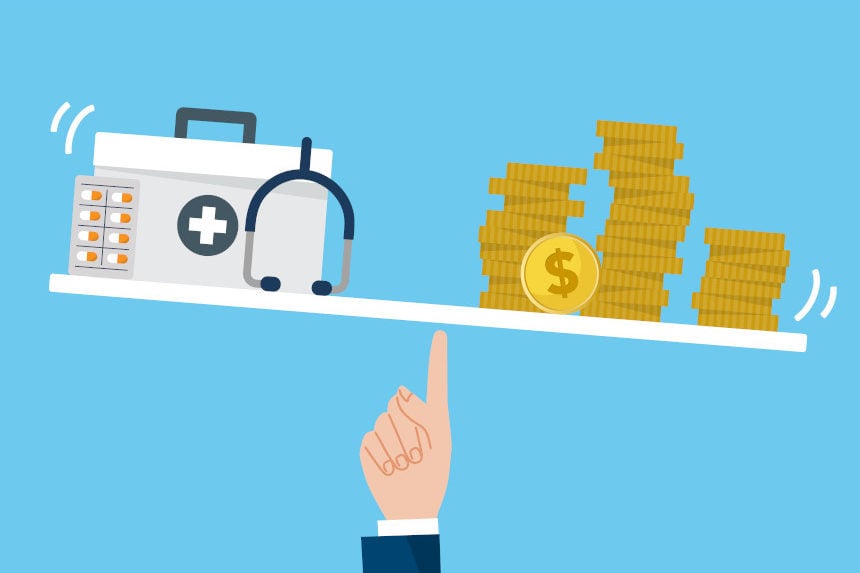In the hospital, sad to say, a body is nothing more than a widget. A body creates revenue if the body is the right kind of sick for the right length of time. Kindly assistants, competent nurses, and decent physicians try to humanize the widget, but they are constrained by a system driven by the bottom line. Certain kinds of illnesses, especially ones treatable with surgery and drugs, make money. Others do not. In a hospital, there is no economic incentive to keep you healthy, to get you well, or for that matter to keep you alive. Health and life are human values, not financial ones; an unregulated market in the treatment of our bodies generates profitable sickness rather than human thriving.
Doctors hate all of this. Doctors of an older generation say that things were better in their time — and, what is more worthy of note, younger doctors agree with them. Doctors feel crushed by their many masters and miss the authority that they used to enjoy, or that they anticipated that they would enjoy when they decided to go to medical school. Young people go to medical school for good reasons, then find their sense of mission exploited by their bosses. Pressured to see as many patients as possible, they come to feel like cogs in a machine. Hassled constantly by companies that seek to pry open every aspect of medical practice for profit, they find it hard to remember the nobility of their calling. Tormented by electronic records that take as much time as patient care, and tortured by mandatory cellphones that draw them away from thinking, they lose their ability to concentrate and communicate.
I learned of these things from the doctors themselves after I was admitted to the emergency room recently for a sudden illness. I was touched and impressed by the nurses who stopped to give me advice and encouragement, the technicians who explained what my tests meant, the transporters who gamely kept up the small talk while pushing my bed, the cleaners who adjusted their schedules so that my floor wouldn’t be slippery when I was trying to get out of bed. Yet all of these people are working within a structure. Hospitals have an incentive to get you out the door when the revenue stream declines, which is not the same thing as an incentive to return you to health. And insurance companies have an incentive not to pay for your tests and treatment.
Every time you are seen by a doctor or a nurse, every time a test is run, the algorithms of the hospital duel with the algorithms of the insurance company to see who will make how much money. Hospitals will tend to carry out procedures that are profitable, regardless of whether they have the best personnel on hand or whether the procedures are truly necessary or beneficial.
An example of the conflict between the profit motive and the healing mission arises in the treatment of infections. Bacteria evolve to gain resistance to antibiotics, which means that new antibiotics are constantly needed. Tens of thousands of Americans already die each year because antibiotic resistance has made their infections intractable. Yet since resistance means that new antibiotics might become obsolete, pharmaceutical companies hesitate to invest in developing them.
The worse the problem of antibiotic resistance becomes, the less hard the market works to find the solutions. Most of the big pharmaceutical companies no longer research antibiotics at all. If pure capitalist logic is applied to health, the bacteria win.
The specialists in profit have made their way into the physical and mental space that was once controlled by the specialists in medicine. As computer programs determine how many patients can be profitably squeezed into a day, doctors become tools. Then the actual machines march triumphantly into the wards. Nurses are now separated from patients by computers on wheels that roll everywhere with them: their bossy robot taskmasters. When you first see a nurse, she or he will likely have eyes on the screen rather than on you. This has dreadful consequences for your treatment, since you become a checklist rather than a person.
Too often, doctors note down what’s convenient rather than what’s true. It’s hard to blame them: They are locked in a record-keeping system that sucks away their time and our money. When doctors enter their records, their hands are guided by the possible entries in the digital system, which are arranged to maximize revenue. The electronic medical record offers none of the research benefits that we might expect from its name; it is electronic in the same sense that a credit card reader or an ATM is electronic. It is of little help in assembling data that might be useful for doctors and patients. During the coronavirus pandemic, doctors could not use it to communicate about symptoms and treatments. As one doctor explained, “Notes are used to bill, determine level of service, and document it rather than their intended purpose, which was to convey our observations, assessment, and plan. Our important work has been co-opted by billing.”
The pressure and complication of insurance and record keeping force doctors to form group practices with other doctors in the same field of specialization. These groups are then purchased by private equity firms to form larger staffing companies, or purchased by hospitals, which are then purchased by other hospitals. Regional oligopolies swallow whatever is in reach, as private equity firms race to make a profit before moving on. Whether a hospital was adequately staffed during the coronavirus pandemic had to do with national balance sheets, not local needs. None of this has anything to do with the basic labor of being a doctor. As Benjamin Franklin wrote in another context, “the Malady consists in the enormous Salaries, Emoluments, & Patronage of great Offices.”
People need doctors close to home. People need doctors whom they know, who know them, who can follow their story, who can take charge in a crisis, who will feel responsible. We need a healthcare system that begins where people live, rather than expecting them to know everything themselves, or to master complicated paperwork, or to pay hidden fees.
Access to medical care is a problem in cities, where the emergency room becomes the first and only resort. Yet care is even more difficult to find across great swaths of the countryside and exurbia, where physicians are scarce and hospitals are distant. About 120 hospitals have closed in rural America in the past decade.
As hard as it is to make it as a community doctor in the cities and the suburbs, it is all but impossible beyond them. It is not that doctors do not want that kind of work; some of them dream of it. It is just difficult to make a living advising and healing people one at a time. Specialists make more money than generalists, and young American doctors usually have debt. As a result, too few decide to become pediatricians and internists. The entire field of geriatrics, care for the aged, is disappearing.
One of the reasons specialists make more money than general practitioners is that surgery is easier to bill, and easier to charge to insurance companies, than primary care. Yet primary care is what matters most for our health and especially for the health of our children. Once again, what is profitable is not what is healthy.
If we value health, we can change what is profitable. It should not be hard to heal people one at a time. Doctors are the people who are trained in both the science and the humanism of care. When we think of medicine, we think of them, rather than of the corporations that hide behind their images on billboards. If we gave doctors the authority they deserve, we would all be healthier and freer. Doctors should be convened to help design a system in which all Americans are insured and have access to the care we need.
Timothy Snyder is the Levin Professor of History at Yale University and the author of The Road to Unfreedom, On Tyranny, Black Earth, and Bloodlands.
From the book Our Malady: Lessons in Liberty from a Hospital Diary by Timothy Snyder, published by Crown, an imprint of Random House, a division of Penguin Random House LLC. Copyright © 2020 by Timothy Snyder.
This article is featured in the January/February 2022 issue of The Saturday Evening Post. Subscribe to the magazine for more art, inspiring stories, fiction, humor, and features from our archives.
Featured image: Shutterstock
Become a Saturday Evening Post member and enjoy unlimited access. Subscribe now




Comments
Medicine, as with everything, has been both politicized and taken over by big corporations who are in the business of making money rather than providing actual health care. Also, since the Federal Government socialized health care for the aged, disabled, and low-income through the Medicare and Medicaid programs, the rules, regulations and restrictions placed upon health care providers has served to make health care much worse, more costly, discriminatory, less available to some people, driven out of business private practitioner’s, served to increase health care costs, and uses fake science to determine health care policies. Hospitals can’t be “fixed” as long as these conditions are in place. I don’t see a good future of health care in the U.S. and expect the eventual government-only health system will be responsible for the death of millions.
While what is reported is correct, what you fail to mention is all the past government regulations imposed by Democratic administrations made it so difficult that many rural hospitals across the country have either gone out of business entirely or transformed into “Emergency Room Only” type clinics. There is no longer a hospital in the county I was raised – Sequatchie County (Dunlap), TN and that’s just sad. Most have to travel miles for the nearest hospitals.
Great article. Thank you
The long time it takes to see a doctor or nurse practitioner for an appointment is terrible. Then it’s probably going to be over the phone.
When blood tests are done it can be 2 months before they finally go over them with the patient, again by phone.
nwh.org Needham MA is a hospital that dos take care of patients with insurance. I have BCBS massachusetts ins.
when I could not walk the hospital had me stay 4 nights and sent me home with PT service for one day a week for a Month I walk very well now and just turned 80 yrs old.
Absolutely true and factual.
SOC standard of care no longer includes checking ears, feet, cancer screening or urinalysis. Everything now is “warm body physical”. Says 75yo hospital professional “from back in the day”.
This terrifying but true feature shines a light on how out of touch the whole medical system is with their patients as bad as the the government is with the American people, which is horrible. If we want to have the right to say we’re the greatest nation in the world and have it be true, then we need to BE that; starting on the most basic levels.
One good thing that went into law as of January 1, 2022 is that patients can no longer get “surprise” medical bills from doctors that were “out of network” while they were in the hospital. If a patient does, they can call that doctor’s office and have it written off. If they don’t, they can be in a lot of trouble now and they know it.
I was surprised in a good way to have heard about this in December. I’m sure there are medical offices that will still send patients these bills in ’22 knowing (hoping?) there will be a certain percentage that don’t know any better AND have the money to ‘just pay it’ without calling or questioning it. It’s a risk though such patients will find out later, and the doctor’s office will have to cut them a check for that amount and be reported as well. It’ll be interesting to see if this happens, and how often as the new year goes on.